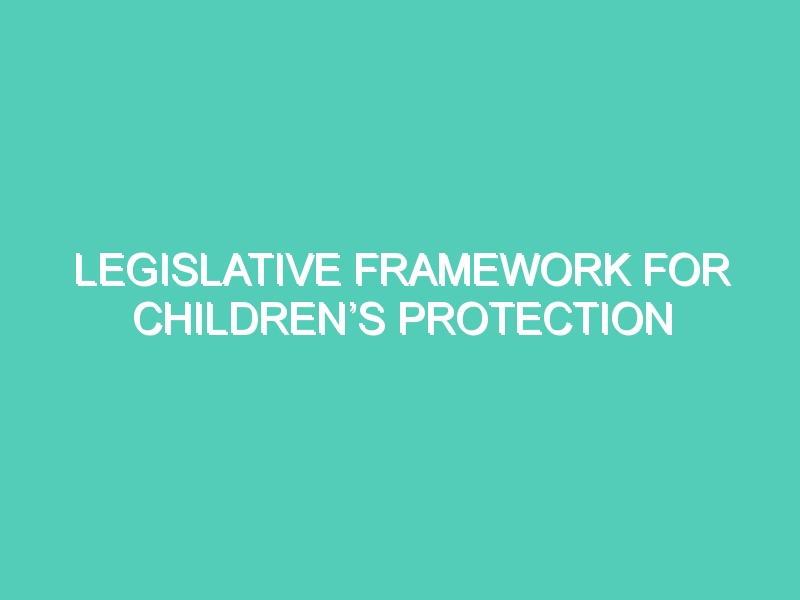“History will judge us by the difference we make in the everyday lives of Children”. – Nelson Mandela
Children are one of the world’s most valuable resource and the most important assets of any nation as they help shape the destiny of the country as future citizens. The children comprise about 50% of the world’s population. The children encounter various difficult circumstances, often on a day to day basis. Children can easily be exploited as they are gullible, owing to their tender age, they are also more vulnerable to abuse. Therefore, the child has the right to be protected by law from all forms of physical or mental violence, injury or abuse, neglect or negligent treatment, trafficking, maltreatment or exploitation, including sexual abuse and it becomes our duty to protect their beautiful smiles.
AIM:My essay will basically deal with the Constitutionalprovisions, facilities and legislative framework for children’s protection in India as provided by the national and state governmentsto safeguard the interest of children as well as a critical appraisal of National Commission for Protection of Child Rights.
INTRODUCTION
National Commission for Protection of Child Rightsis a statutory body also known as NCPCR. It was constituted by the Government of Indiain March 2007, in pursuance of the Protection of Child Rights (CPCR) Act, 2005 to exercise and perform the powers and functions assigned to it under the CPCR Act. These mainly included the tasks to promote and defend the child rights in our country.The CCPR Act provided for the establishment of National Commission under Section 3 and State Commissions for Protection of Child Rights under Section 17.
Wide ranging powers have been vested in the hands of NCPCR which can only be performed by itself and no governmental authority can intervene in the functioning of theCommission. It works independently rather than working with the government authorities.Thus, the commission main objective is to promote the overall wellbeing of the children’s rights.So, in a way it can be called ‘The guardian of Child Rights’.
CONSTITUTIONAL PROTECTION TO CHILDREN:
The Constitution of India provides for various protection to the children for their overall development.Article -15 of the Indian Constitution provides some special measures for classes of the citizens which needs more attention than any other class needs for positive impact and for overall improving their status in the society and Article 15(3) provides that the State can make special provisions for women and children.Article 21-A of the Indian constitution directs the state for free and compulsory education to all children in the age group of 6-14 years also called Right To Education.[i] Article-23 prohibits trafficking of human beings and forced labour and in the case of Raj Bahadur v. Legal Remembrancer of Government of West Bengal,[ii] it was held that Article 23 of the Constitution provides for prohibition of traffic, inter alia’, in human beings, which would include traffic in women and children as well, for immoral or other purposes.Article-24 prohibits employment of children below 14 years in factories, mines and other hazardous occupations[iii]and was discussed in detail by Supreme Court in the case of Bandhua Mukti Morcha.[iv]Even the importance of Directive Principles of State Policy in the context of child rights was considered at length in the same case.The Directive Principles of State Policy under the Constitution, under Article 39 (e) of the Constitution orders that the State shall direct its policy, in such a way, that the tender age of children is not abused. On a similar note, Article-39(f) directs the state that the children are to be given opportunities and facilities to develop in a healthy manner and in conditions of freedom and dignity.
Legislation and Policies for Children:
The Constitutional protection framework include the Prohibition of Child Marriage Act, 2006,Juvenile Justice (Care and Protection of Children) Act, 2015 (JJ Act 2015), the Child Labour (Prohibition and Regulation) 1986 (as amended in Act, 2016), the Infant Milk Substitutes, the Protection of Children from Sexual Offences Act 2012 (“POCSO Act”),Feeding Bottles and Infant Foods(Regulation of Production, Supply and Distribution) Act, 1992, the Immoral Traffic (Prevention) Act, 1956, the Right of Children to Free and Compulsory Education Act, 2009 (“RTE Act”) and the Pre-Conception and Pre-Natal Diagnostic Techniques Act, 1994etc.[v] Apart from these there are child-friendly provisions in other legislations, like Indian Penal Code, Criminal Procedure Code, etc. Apart from these, there are several other policies of the Government of India as well that address children. These include The National Plan of Action for Children, 2005, The National Policy for Children, 1974; The National Policy on Child Labour, 1987; The National Charter for Children, 2003; The National Policy on Education, 1986; etc.
Also, the legislation which made the policies for children have in a way have had a positive impact on their lives and improved their overall development and situations.The National Policy for Children, 2013 defines a child.[vi]The Government of India amends the provisions of the policies regularly based on the protection for children’s rightwhich helps them to include, grow, empowers the children not only in community but also individually.The state also taken the affirmative safeguards and policies to prevent theviolations of children’s right.The National Commission for Protection of Child Rights and State Commissions for Protection of Child Rights is mandated to ensure that the principles of this Policy are respected in all sectors at all levels in formulating laws, policies and programs affecting children.[vii]
ORIGIN OF NCPCR
The United Nations Convention on the Rights of the Child (“CRC”) was adopted by the UN General Assembly and India assented to the CRC on 11 December 1992.The basic objective of this Convention was to enable every child the right to survive and develop in a healthy environment. The CRC makes it obligatory for State parties to take all necessary steps for the effective protection of children. After this Convention, The National Commission for Protection of Child Rights (NCPCR) was established by the Government of India in March 2007. It was established for the betterment or improving the lifestyle of the children by respecting their rights personally by helping such classes of citizens who are underprivileged and who are unable to fulfil their temporary needs. Thus, the Commission helps such classes to maintain their status equally in the society.
CRITICAL APPRAISAL OF NCPCR
NCPCR is a National Human Rights Institution (NHRI) just like National Human Rights Commission. The Paris Principles sets out six main criteria that NHRIs are required to fulfill. It therefore becomes necessary to analyze the NCPCR’s operations along with these standards, particularly in the contexts of its competency, independence, accessibility and accountability. In this regard, a study by the Centre for Child and the Law, National Law School of India University, Bangalore (CCL-NLSIU), has identified certain features of the NCPCR as against the abovementioned standards.
Appointment and Composition: The Commissions for Protection of Child Rights Act, 2005 and the NCPCR Rules regulate the composition of the NCPCR. The Paris Principles discourage the appointment of persons belonging to political parties/government servants as members of the NHRIs. But, in stark contrast, firstly, there is absence of a ban on the appointment of members of political parties and bureaucrats as Chairpersons or Members of the Commission, secondly, there is delay in appointments and prolonged and thirdly, there is lack of transparency in the appointment process.
Governmental influence, and Operational and Financial Independence: The Paris Principles discourage NHRIs from relying on the government for staff and infrastructure but in reality, under the CPCR Act, the Commission does rely on the government for the abovementioned purposes. This certainly raises issues as to theknowledge of the staff, as well as a possible threat to the Commission’s independence. NCPCR in 2016 also indicated a heavy preference for retired bureaucrats for contractual positions. Furthermore, the NCPCR’s negligible financial independence i.e. having received funds by government grants and taking government’s prior approval before incurring expenditure, does not meet the Paris Principles’ requirement of financial independence.
Competency and Responsibilities: The authority of NHRIs to independently investigate complaints is undoubtedly crucial to the task of human rights protection. As opposed to this, NCPCR does not have the express power to frame its own regulations and it does not have any powers of investigation under the CPCR Act.
Decision-making and Quasi-Judicial Competence: According to the Paris Principles, an NHRI must be authorized to hear complaints of alleged human rights violations, investigate such occurrences, and ultimately bring about a settlement, pass binding decisions or recommend prosecution against the perpetrators. However, CPCRs can neither bring about settlements through conciliatory processes, nor issue binding decisions. They are also not empowered to investigate alleged violations, intervene in ongoing cases or demand a response to their recommendations from authorities.
Accessibility:Perhaps, one of the most important roles of NHRIs is to be accessible to those who need them. NHRIs are supposed to be both geographically and physically reachable to children, while the ICHRP recommends that they be accessible also to persons with disabilities. However, these provisions are absent in practice as in that the CPCR Act is silent in this regard and the National and State Commissions have been situated only in capital cities.
An alteration to the CPCR Act, in accordance with the international standards, is perhaps the most effective way to free the NCPCR from political and governmental strings and enable it to become an independenthuman rights institution. Arguably, a strict and noteworthy change in the appointment and selection processes, hiring, operational and financial functions of the Commission is also necessary to enable it to be in compliance with its mandate.
WAY FORWARD
Despite the existence of plethora of Constitutional guarantees, various government’s schemes and other child development initiatives, a vast majority of children in India are still suffering. Child rights activists in the country have observed that there are millions of children who are still facing wide spread hazards, deprivations as well as discrimination.
Even though the awareness about child rights has increased since the past two decades and a number of laws and legislations have been passed in this regard, we are still lagging behind.We are yet to see concrete results in this regard. This clearly indicates nothing but the ineffectiveness of the state in implementing the various laws and legislations. Until the State and the Central government adopt some strict measures, results won’t be yielded, no matter how many NGO work for this cause. Another grave issue is the removal of uncertainties and confusions in the Constitutional and statutory provisions ang along with that to make the NCPCR more effective.[viii] Until these two objectivesare achieved, the ambition of ending child sufferingswill remain a distant dream.
CONCLUSION
The National Commission for Protection of Child Rights(NCPCR) was incorporated by the Government of India in March, 2007 under the Commissions for Protection of Child Rights(CPCR) Act, 2005,for the protection and promotion of child rights and prevent the atrocities happening against children in the country. The UN General Assembly was the first one to take the affirmative steps regarding the violation of children’s rights in 1992. It made people across the globe aware that a child age less than 18 years of age has some unique human rights which should not and cannot be violated by anyone. Our country following the same steps adopted the same and made the provisions and statutes as per the guidelines given by the Paris Principles.
All in all, the basic aim of NCPCR is to monitor the authorities to take cognizance of cases which affects child protection rights.Despite its shortcomings, it still is one of the most reliable and independent body according to which no negligence would be tolerated in connection to protection of child rights. Even though there are numerous other problems which the NCPCRhas not been able to address appropriately, we are sure that in the near future, these issues will be resolved and the Commission will be able to function effectively once again.
Article Written By- Gauri Choubay
Law Student– DME School of Law
(HRDI Work From Home Internship)
[i]https://www.oxfamindia.org/blog/10-things-rte
[ii]AIR 1953 Cal 522 at 524
[iii]https://www.jstor.org/stable/43952432
[iv] (1997) 10 SCC 549
[v]https://www.ncbi.nlm.nih.gov/pmc/articles/PMC7320727/
[vi]https://www.deccanherald.com/content/423284/minister-repealing-her-own-law.html
[vii]https://www.jaypeedigital.com/eReader/chapter/9789386150875/ch32



